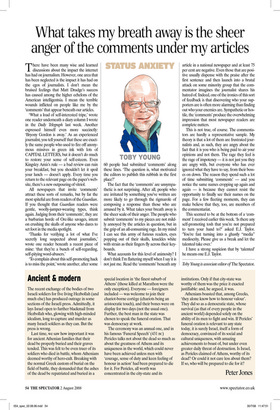What takes my breath away is the sheer anger of the comments under my articles
There have been many wise and learned discussions about the impact the internet has had on journalism. However, one area that has been neglected is the impact it has had on the egos of journalists. I don’t mean the bruised feelings that Matt Drudge’s success has caused among the higher echelons of the American intelligentsia. I mean the terrible wounds inflicted on people like me by the ‘comments’ that appear beneath our articles.
‘What a load of self-interested tripe,’ wrote one reader underneath a diary column I wrote in the Daily Telegraph last week. Another expressed himself even more succinctly: ‘Bryony Gordon is away.’ As an experienced journalist, you tell yourself that these are exactly the same people who used to fire off anonymous missives in green ink with lots of CAPITAL LETTERS, but it doesn’t do much to restore your sense of self-esteem. Even Kingsley Amis’s rule — a bad review can ruin your breakfast, but you shouldn’t let it spoil your lunch — doesn’t apply. Every time you return to the relevant page on the paper’s website, there’s a new outpouring of vitriol.
All newspapers that invite ‘comments’ attract these sorts of remarks, but by far the most spiteful are from readers of the Guardian. If you thought that Guardian readers were gentle, woolly-jumper-wearing types, think again. Judging from their ‘comments’, they are a barbarian horde of Orc-like savages, intent on crushing the skulls of anyone who dares to set foot in the media spotlight.
‘Thanks for verifying a lot of what I’ve secretly long suspected about journalists,’ wrote one reader beneath a recent piece of mine: ‘that they’re a bunch of self-regarding, self-pitying word-abusers.’ ‘To complain about this self-promoting hack is to miss the point,’ wrote another, after some 60 people had submitted ‘comments’ along these lines. ‘The question is, what motivated the editors to publish this rubbish in the first place?’ The fact that the ‘comments’ are unsympathetic is not surprising. After all, people who are irritated by something you’ve written are more likely to go through the rigmarole of composing a response than those who are amused by it. What takes your breath away is the sheer scale of their anger. The people who submit ‘comments’ to my pieces are not mildly annoyed by the articles in question, but in the grip of an all-consuming rage. In my mind I can see this army of furious readers, eyes popping out of their skulls, knuckles white with strain as their fingers fly across their keyboards.
What accounts for this level of animosity? I don’t think I’m flattering myself when I say it is not just me. Read the ‘comments’ beneath any article in a national newspaper and at least 75 per cent are negative. Even those that are positive usually dispense with the praise after the first sentence and then launch into a brutal attack on some minority group that the commentator imagines the journalist shares his hatred of. Indeed, one of the ironies of this sort of feedback is that discovering who your supporters are is often more alarming than finding out who your enemies are. Sympathetic or hostile, the ‘comments’ produce the overwhelming impression that most newspaper readers are complete nutters.
This is not true, of course. The commentators are hardly a representative sample. My theory is that a lot of them are frustrated journalists and, as such, they are angry about the fact that it is you who is being paid to air your opinions and not them. The rage they feel is the rage of impotency — it is not just you they are angry with, but everyone who has ever ignored what they have to say, from their bosses on down. The reason they spend such a lot of time submitting ‘comments’ — and you notice the same names cropping up again and again — is because they cannot resist the opportunity to finally see their names on the page. For a few fleeting moments, they can make believe that they, too, are members of the commentariat.
This seemed to be at the bottom of a ‘comment’ I received earlier this week. ‘Is there any self-promoting tosh that you’re not prepared to turn your hand to?’ asked E.J. Taylor. ‘You’re fast turning into a ghastly “media” mediocrity. Please give us a break and let the talented take over.’ I have a strong suspicion that by ‘talented’ he means one E.J. Taylor.
Toby Young is associate editor of The Spectator.


























































 Previous page
Previous page